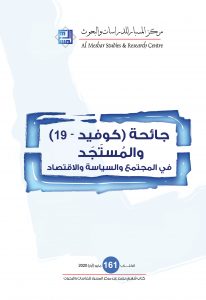 In its new book The Pandemic (COVID-19): Developments in Society, Politics, and the Economy (volume 161, May 2020), Al-Mesbar Center for Studies and Research deals with the effects of the pandemic on societies, individuals and states. It adopts a multidisciplinary approach, drawing from sociology, psychology, philosophy, politics, and economics, in order to assess the pandemic’s complex and variegated effects.
In its new book The Pandemic (COVID-19): Developments in Society, Politics, and the Economy (volume 161, May 2020), Al-Mesbar Center for Studies and Research deals with the effects of the pandemic on societies, individuals and states. It adopts a multidisciplinary approach, drawing from sociology, psychology, philosophy, politics, and economics, in order to assess the pandemic’s complex and variegated effects.
The book begins by addressing the repercussions of “trauma” in societies, which have stoked a wave of uncertainty that threatens longstanding preconceptions. The shifting patterns of daily life with respect to business, schools, travel, entertainment, and social connectivity have provoked extreme reactions of diverse kinds. On the one hand, social diseases, such as “domestic violence,” have grown, while on the other hand, there are signs of hope in the form of innovative ways of teaching and learning, among other examples — signs that societies remain capable of adapting and collaborating to address a shared challenge.
The book addresses the psychology of responses to the pandemic, and the pathways of psychological recovery. “Much of what we say about the Coronavirus crisis is still impressionistic. But psychological research can shine a lot on aspects of the crisis surrounding the pandemic and how we can address them.
The developing virus (Covid-19) affects individual and collective behavior. The book addresses a broad question: Do the new personal health practices imposed by the pandemic represent a new normal?
With respect to education, the book addresses the challenges of distance learning in the UAE, assessing the adjustments that have been developed thus far and their outcomes.
The book contains three sociopolitical and philosophical readings of the health crisis as well. The first addresses the impact of social distancing. A second traces the relationship between the crisis and the resurgence of nationalism alongside it. It also surveils the new trend of calls for tolerance and openness, from collective prayer to human rapprochement, driven by the singularity of the challenge. The third study notes that while pessimism has taken hold in some quarters, in others, hope in scientific, technological, and medical innovation has brought a new sense of optimism.
Other chapters explore the political debate in Europe concerning security — amid the state of emergency declared in more than one European country — and its relation to the disruption of democratic life. Chapters also address the effects of the pandemic on international affairs, focusing on the course of relations between China and the United States, and debates about “the formation of a new global order,” and the perceived “end of the era of a unipolar world.”
The book examines how European right-wing parties are dealing with the crisis, including its exploitation to promote ethnic and religious hatred. Amid rising xenophobia, the crisis has prompted a new exploration in Europe about the self, the other, extremism, immigration, and social solidarity.
The book also explores the economic repercussions of the pandemic. It explores the potential to jumpstart the “digitization of the economy” with respect to a range of institutions, corporations, and states. It also examines emerging ideas about the possible formation of an alternative to “economic liberalism,” in light of growing economic uncertainty. They book monitors the impact of the virus on the global economy, global food security, and Arab and Gulf economies in particular, with an eye to the potential trajectory for recovery.
Social, scientific, political, and economic interaction with the pandemic remains an open-ended research issue. This effort is being monitored in an attempt to understand how we think during crises. The book comes out with an initial observation that stands between two currents: One: He thinks that everything has changed forever, and another sees that nothing will change; The task of scientific research is to provide the right basis for understanding the catalytic role of these crises, and to give researchers the essential material to foster future thinking.
Al-Mesbar Center would like to thank all the researchers who contributed to the book — in particular our colleague Rita Faraj, who coordinated its production.










